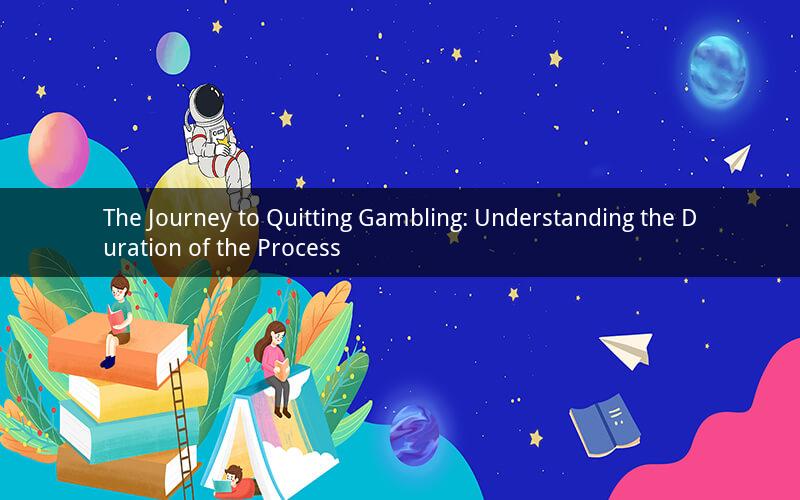
The question of how long it takes to stop gambling is one that plagues many individuals who are struggling with gambling addiction. Quitting a gambling habit is not an easy feat, and the duration it takes to overcome it can vary widely from person to person. This article explores the factors that influence the time it takes to stop gambling, the stages involved in the process, and provides insights on how to effectively navigate through them.
Understanding the Process
The process of stopping gambling can be divided into several stages. Each stage plays a crucial role in the overall journey, and it is essential to understand these stages to gain a clearer picture of the process. The stages typically include:
1. Denial: This is the initial stage where individuals may not acknowledge that they have a gambling problem. They may downplay the extent of their gambling or attribute it to luck.
2. Recognition: Once the problem is acknowledged, individuals may begin to recognize the negative consequences of their gambling habit, such as financial difficulties, strained relationships, or work-related issues.
3. Acceptance: In this stage, individuals accept that they have a gambling problem and are willing to take steps to address it. This could involve seeking help from friends, family, or professionals.
4. Preparations: The preparation stage involves developing a plan to quit gambling. This may include setting goals, creating a support system, and identifying potential triggers for relapse.
5. Abstinence: The actual quitting stage, where individuals cease gambling activities and strive to maintain abstinence.
6. Relapse and Recovery: Despite the best efforts, individuals may experience setbacks or relapses. This stage involves learning from these experiences and seeking further support to recover.
Factors Influencing the Duration
The duration of the process to stop gambling can be influenced by various factors. Here are some key factors to consider:
1. Severity of the Problem: The severity of the gambling problem plays a significant role in determining the duration of the process. Individuals with more severe addictions may require longer periods of treatment and support.
2. Personal Motivation: The level of motivation to quit gambling can greatly impact the process. Individuals who are highly motivated are more likely to succeed in overcoming their addiction.
3. Support System: A strong support system can make a significant difference in the duration of the process. This can include friends, family, therapists, or support groups.
4. Professional Help: Seeking professional help, such as therapy or counseling, can speed up the process of quitting gambling. Professional support provides individuals with the necessary tools and strategies to overcome their addiction.
5. Coping Skills: Developing effective coping skills can help individuals manage cravings and stress, making it easier to quit gambling. Techniques such as mindfulness, relaxation exercises, and problem-solving skills can be beneficial.
The Importance of Patience
It is crucial to approach the process of quitting gambling with patience. Quitting an addiction is a challenging endeavor that requires time and dedication. It is important to understand that there is no fixed timeline for recovery, and progress may vary from person to person.
5 Questions and Answers
Question 1: How long does it take to notice changes after quitting gambling?
Answer: The time it takes to notice changes can vary. Some individuals may experience immediate changes, while others may take weeks or even months to see significant improvements.
Question 2: Can medication help in quitting gambling?
Answer: While there is no specific medication for gambling addiction, certain medications can help manage the symptoms of underlying mental health conditions that may contribute to gambling addiction. It is important to consult with a healthcare professional for appropriate medication recommendations.
Question 3: Is it normal to experience cravings or relapses during the quitting process?
Answer: Yes, experiencing cravings or relapses is a common part of the quitting process. It is important to recognize these moments as opportunities for growth and to seek support to overcome them.
Question 4: How can I cope with stress while trying to quit gambling?
Answer: Developing healthy coping skills, such as exercise, hobbies, or mindfulness practices, can help manage stress. Additionally, seeking support from friends, family, or support groups can provide emotional support during challenging times.
Question 5: Is it possible to quit gambling on my own?
Answer: While it is possible to quit gambling on your own, seeking professional help or joining support groups can greatly increase the chances of successful recovery. Professional guidance can provide personalized strategies and support throughout the process.
In conclusion, quitting gambling is a complex journey that requires time, dedication, and patience. Understanding the stages of the process and the factors that influence the duration can help individuals navigate through the challenges and increase their chances of successful recovery. By seeking support, developing coping skills, and maintaining a strong support system, individuals can overcome their gambling addiction and move towards a healthier, more fulfilling life.